#stream ecology
Text
There's already some models up on sketchfab, which you can view for free here
#freshwater#freshwater mussels#mussels#mollusca#bivalvia#bivalves#freshwater ecology#stream ecology#this is BIG news as these models will eventually be freely available to download and print#so classrooms can have models of freshwater mussels in their classrooms#and mussels are notorious for their difficulty in identifying#and a lot of specimen shells have to be kept in museums and cannot be handled bc they are too fragile#and the specimen is too rare
46 notes
·
View notes
Text
The more you learn about freshwater ecology, the more you will start to hate dams with the fiery passion of a thousand hateful suns
#stop fucking up streams and rivers#you're preventing migration#restricting nutrient flow#killing species#and generally making things worse#freshwater ecology#freshwater biology#ecology#dam
151 notes
·
View notes
Text
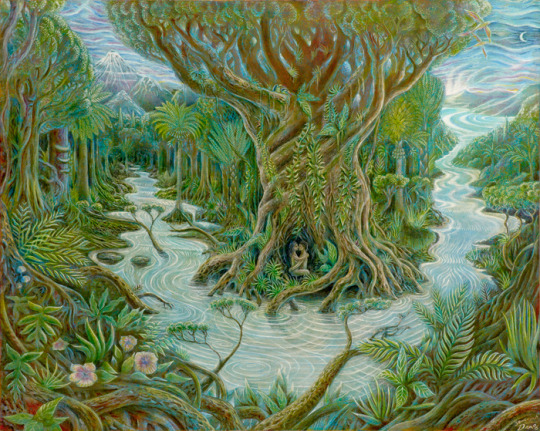
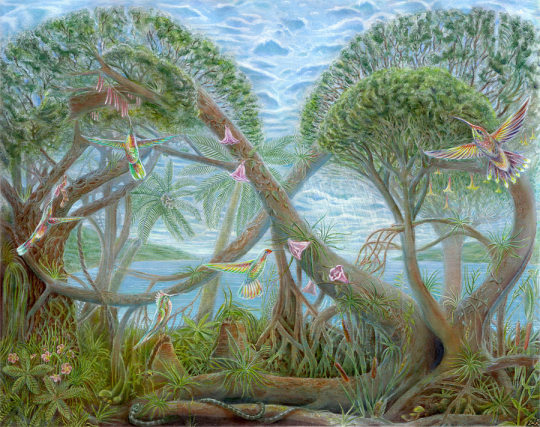
Fertility Circuit, Deep Ecology- Daniel Mirante
#nature art#lush#rainforest#forest#tropical#river#streams#jungle#trees#vines#beauty#beautiful#escape#pretty#art#nature#flowers#hummingbird#ecology#deep in the forest#spiritual#mysterious#mystical#green#green aesthetic#twisted trees#night#earthy#rebirth#new beginnings
918 notes
·
View notes
Text
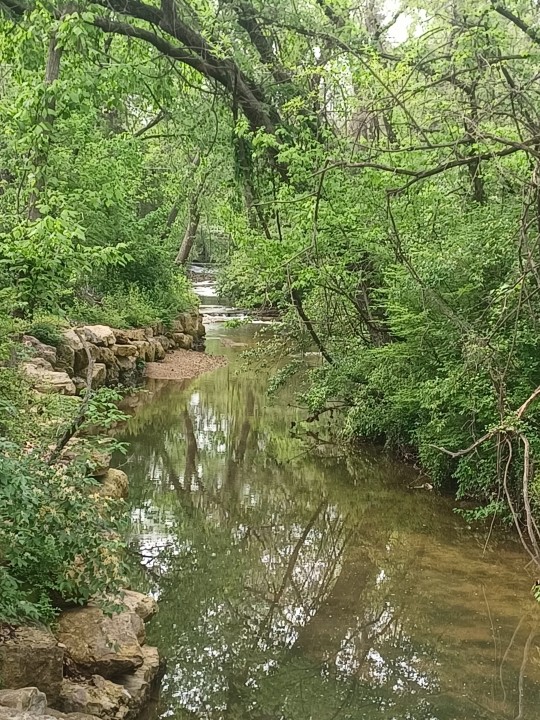
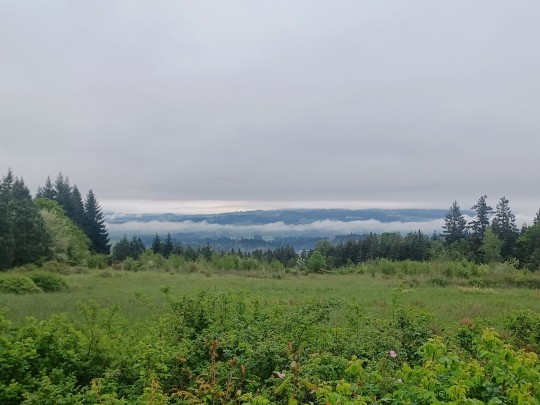
Two beautiful scenes, two very different oak habitats. The first is my childhood creek, rather unceremoniously named "Dutro-Carter Branch", in Rolla, Mo. It runs through mostly badly damaged to completely erased oak-hickory forest, with just a thin veil of habitat on either bank, where it exists at all. The other is Cooper Mountain in Tualitin, OR, where Garry oak savanna and woodland are being restored amid patches of Ponderosa pine and mixed conifer forest. I arrived back in the PNW last Thursday evening after five days of driving and immediately leaped back into teaching the next day. While I've scarcely had time to stop and rest, and the next several days will be similarly busy, I'm glad I get to ground myself in these beautiful, fragmented places in nature.
#oak trees#oak#trees#creek#stream#water#landscape#landscape photography#Ozarks#Missouri#Missouri Ozarks#PNW#Pacific Northwest#Cascadia#habitat restoration#restoration ecology#ecology#nature
18 notes
·
View notes
Text
The Wolf
In 1970, an ecologist named David Mech published a book called “The Wolf: The Ecology and Behavior of an Endangered Species.” A book which catalogued all the information researchers had at the time on the worlds of wolves. A book that Mech himself would later spend the rest of his career trying to end the publication on. You see, Mech had mistakenly used research on wolves that were held in captivity, and found later that much of the assertions made in it did not hold up to scrutiny when observing wolves in the wild.
In the west we’ve heard, often to death, of the “Alpha Wolf.” We compare people to wolves quite a bit. Especially in the recent trend of armchair youtube “sociologists” and american conservative grifters attempting to explain human behavior in terms of so-called “Alphas” and “Betas,” a great many people still believe that humans, by nature, are pack animals with rigid heirarchies. Like the wolves in Mech’s research: The strongest, most fit male eats first while the weaker of the pack get what’s left over. The Alpha leads the pack, makes key decisions for them, and always has first pick of the mate. Mech’s research contained much of the information used to argue this point and it was inaccurate. Mech researched only wolves in captivity, however, when he took to observing wolves in the wild, he quickly realized how this view of captive animals was simply not how free creatures organize. A pack of wolves in the wild is a family; usually, two parent wolves with a litter of puppies. There’s no “Alpha” male, there’s a father. And the weakest pups certainly do not eat last, quite the contrary. This dynamic is more indicative of a community than a heirarchy.
In research such as this, we can infer that animals in captivity adopt new forms of social organization in order to cope with their incredibly narrowed freedom. Often this organization is inherited from the order they were bred from, forcing them to maintain it generation after generation.
Despite this false representation, I actually do believe people are like the wolves in Mech’s book. I believe that we are in captivity. One so coercive that it encourages us to believe in social heirarchies. We organize our worlds around it. We have our bosses, our landowners, our teachers, our leaders. We see each other as rungs of a social ladder to step on in order to make it to the next level. We either live believing we are or can be the “alpha wolf,” or we struggle accepting that we will only eat when it is our turn. And for what? Why allow our choices and passions be squandered by believing we must adhere to rules upheld by those who are superior in title only?
In my neighbors, my friends, my families, I see animals in a cage. I see a polar bear that shuffles back and forth all day in a bored frustration like an animatron. I see a whale with a melancholic song for a mate, though it has no room in its tank for itself let alone another. I see a panda that refuses to mate, lest it doom its child to a life too much like it’s own. I see a wolf that would want nothing more than to sprint as far as its breath can carry it to the far reaches of the forest it calls its home. Wishing only to be stopped, not by the glass of an enclosure, but by the limitations of its own, wild imagination.
We are not ranks in a social order. We are beings whose freedom has been withheld. We crave free community, free association.
"To look at people in capitalist society and conclude that human nature is egoism [greed and selfishness], is like looking at people in a factory where pollution is destroying their lungs and saying that it is human nature to cough," says Andrew Collier.
We are not free, we are captives. And attempting to learn the potential of an enclosure will get us nowhere closer to freedom. We can appreciate those who were able to conquer or cast aside that cage, like Emerson or Thoreau. And we can find a glimmer of hope beam into our enclosures from the minds that saw hope beyond the cage, like Goldman or Tolstoy. But until we can learn to band together as the wolves we are and break loose of our captivity, we can never truly be free.
mae
#stream of thoughts#thoughts#journal#journaling#capitalism#anarchism#anarchy#sociology#anti capitalism#freedom#coercivecontrol#anticiv#coercion#control#free association#nature#wolves#ecology#captivity#this swam around my head for weeks and needed to be put somewhere
10 notes
·
View notes
Text

𝔇𝔢𝔢𝔭 𝔦𝔫𝔱𝔬 𝔱𝔥𝔢 𝔴𝔬𝔬𝔡𝔰 𝔬𝔣 𝔒𝔯𝔢𝔤𝔬𝔫
#oregon#woods of oregon#oregon forest#forest#pnw#pacific northwest#pacific north west#washington#washington state#cascadia#ecology#biodiversity#stream#water stream
120 notes
·
View notes
Note
who's the smelt researcher whose lab you applied to?
it took me a moment to remember what you meant because I a) forgot I applied for that & b) forgot I posted about it here lol but it was a mentee program under Anna Medina, a grad student at UAF CFOS. why do you ask?
#someone else got picked obv#I'm doing stable isotope analysis this summer & stream ecology stuff in fall though so oh well it all works out
2 notes
·
View notes
Text
the 4 hours of sleep have hit exactly Now
#today was fun#i caught a baby salamamder and fish in the stream during my friends lab that i was allowed to crash!#(im doing research with the professor next year lol) (and its an intro ecology course)#amd work is fun too#but Wow im tired Right Now
5 notes
·
View notes
Text
Do you ever think you’re not meant for this world and would fit so much more easily into the depraved sex horror mutilation novels you’re so fond of
#I’ve been through so much fucked up shit and now I’m just supposed to go to work?#sometimes I feel like I’m on a different plane of reality that only people who have been exposed to horrific things can access#and that’s why it’s so hard to get along with people. like they don’t know what it’s like to suffer#there’s a degree of pain where you turn into an animal . and someone needs to have known that#it’s like we’re entirely different organism like Neanderthals and Homosapiens. same ecological niche but fundamentally not the same#that metaphor will break down if you squint too hard at it#this is very stream of consciousness#but genuinely a lot of my closest relationships throughout my life have been with cult survivors and people who’s parents are murderers#or have survived similar shit that I have. I dated a guy in high school who’s dad shot his grandma while he was asleep in the house#(for those who keep track he’s the one who left his literal nazi fiancé for me . he was a nice enough guy just in a complicated situation)#it’s like we can all speak the same language without sounding like gibberish#I love not phasing people it’s so humiliating when my life is the most horrific thing someone has ever heard of#anyway the novel I finished today was very comforting . to me <3 it felt like a world I’d like to sink into and live in#give it up for auto-amputation
10 notes
·
View notes
Text
things I am happy about with the school I am accepted to: went there for undergrad so I know it and the area well, pretty close to where I live now so Missy won't have as long a car ride as some other schools would have been, it has a center for fisheries and aquatic sciences, I had one of the professors from the center as a lab professor in undergrad and really liked him, have talked to him already and he was very helpful, I will be physically closer to a some of my friends but also not too far away from my friends here or my sister
things I am nervous about: what if neither professor in the center for fisheries and aquatic sciences will agree to be my thesis mentor, what if I don't get a TA/GA position because this is going to be a lot of money, what if I completely bomb whatever application/interview process I have to go through for the center
things I feel weird about: this is not a particularly exciting school and I am worried people (my family) will say some shit and make me feel bad about it
#I am very excited!!!!!!#I am very ready to get out of the city#I am very excited about learning more science#I want to learn about fish and streams and ecology#I think about it Constantly guys#but now the real fear comes of what if the people I want to work with don't want to work with me *barf*#what if I am good enough for general science but not for aquatic sciences because I have no experience with it#and then my family has said a lot about how long it took me to apply and that maybe if I had been faster I could have gone to cooler schools#and I am worried if I do decide to go here they will say some shit about how I went to this school for undergrad#and how it isn't like a prestigious science school or that it's in the midwest#I just feel good and excited and nervous right now but I have this problem where any time I feel good like this#I go and look for things to make me feel bad about feeling good (I could give so many examples... it's a problem)#and I trying very very hard to Not do that right now#and I don't want my family to do it for me
4 notes
·
View notes
Note
I would love to hear your drunk joy about your restoration projects!
Hello hello! Unfortunately all I can offer is sober joy since it is now the next morning. I gave one answer to this over here but I would love to talk to you about stream restorations!
Ok, so simplifying a whole bunch of stuff here…
When rain falls on a forest or other natural area, it gets absorbed by plants or seeps into the ground, and slowly makes its way to water bodies. This is good. When rain falls on roads and buildings it moves pretty fast to the lowest possible point, picking up dirt and pollution along the way. When that lowest point is a stream, this fast-moving water can erode away the stream bank, causing more sediment to get into the stream and scouring the bottom in a vicious cycle that just makes the water flow faster and erode the stream more. Plus fast moving water hangs on to all of the pollutants it picks up along the way because they don’t have time to settle out, so they all get dumped into the big water bodies.
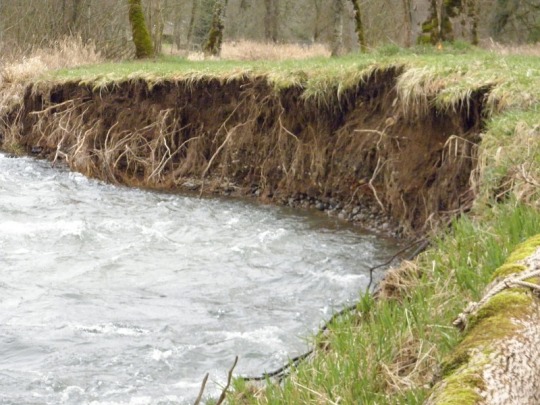
Look at those sad roots hanging out there! Breaks your heart!
What we do is take these beat up, polluted streams, and we engineer ways to slow them down. That usually involves digging a new path that meanders more, putting in stone that won’t be eroded, and re-grading the banks so that they slope gently and are planted with native plants that naturally slow down the water and suck up the nutrients it’s carrying.
Sometimes, where It’s ecologically appropriate, it involves building beaver dam analogues! This is where we take any trees we had to cut down because they were in the way of a good meander or they were an invasive species and pile them up like a beaver would! On one of our recent projects we actually had a beaver move into the structure we built!!! He made some renovations of course but seems to be living there happily!
When we’re done, in addition to creating good natural habitat, we’ve got a whole lot of native plants that are slowing down the water and using the nutrients, and the slower water is dropping its pollution so it’s dispersed and not hurting anything.
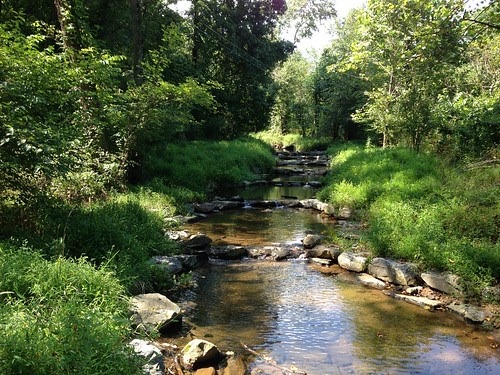
I’m resisting the urge to post pictures of my company’s projects because I don’t actually want to dox myself, but this is a good example of a restored stream.
So that’s the other part of what the money from this deal is going to go into!
12 notes
·
View notes
Text
This is a long shot but if someone can save me a few hours worth of research I'd be super grateful
I am a field technician doing stream monitoring and my local county department is developing a more detailed assessment method using family-level pollution tolerances rather than the more commonly used method of sorting specimens into either Philopotamidae vs. Hydropsychidae. Through my research I've found that tolerance varies between members of the same family, and it is useful to also be aware of genus-level tolerances. Unfortunately, I haven't been able to find a good reference for many genera (except for macroinvertebrates.org, love that site) I also don't have access to paywalled research papers and have been stuck with looking through old government reports and open-source journals. Is anyone willing to share a good paper/report/website with me that includes any information available for Trichoptera (and any other macroinvertebrate order) genera-level tolerance values?
(I tried posting on reddit but all the relevant invert forums are dead)
#wrenfea.exe#invertebrates#macroinvertebrates#trichoptera#caddisfly#biomonitoring#stream science#stream ecology#freshwater ecology#bugs#insects#larvae#larva#fishing#btw if anyone is interested in aquatic insects please look at macroinvertebrates.org its amazing#biology#marine science
11 notes
·
View notes
Link
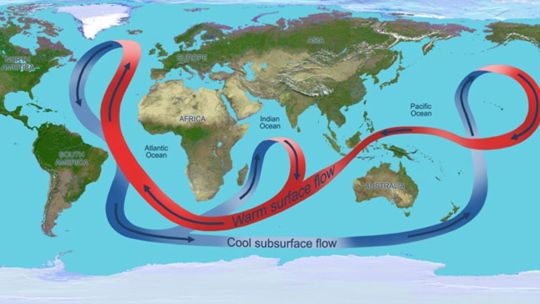
Excerpt from this story from Earther/Gizmodo:
A shutdown of a major current in the Atlantic Ocean would rapidly transform wind, temperature, and precipitation patterns across the whole globe, according to new research.
The current is already slowing, likely at least in part because of human-caused climate change. Now, scientists have found that, if the Atlantic Meridional Overturning Circulation (AMOC) collapses completely, there would be never-before-predicted impacts, according to a study published last week in the journal Nature Climate Change.
The researchers determined that, without the AMOC, the tropical Pacific Ocean cools, and trade winds intensify and shift south. The resulting climate state would resemble a permanent La Niña and could trigger catastrophic monsoons and flooding in the South Pacific, along with increased drought and heat in parts of North America.
In other words: If human actions make the AMOC run amok, the ensuing climate chaos would be even worse and weirder than previously expected.
The Atlantic Meridional Overturning Circulation is a critical pattern of flow that moves warmer water from farther south into the North Atlantic Ocean. It transports carbon, nutrients, and heat—helping to fuel fisheries and regulate Europe’s mild climate. The AMOC is why London is very close in latitude to L’Anse-au-Loup in Canada’s Newfoundland and Labrador but has an average January temperature that’s 39 degrees Fahrenheit warmer.
AMOC’s conveyer belt is driven by gradients of heat and salty-ness in the ocean. Differences in density push water around. As ice melts or the oceans freeze, the relative temperature and salinity of water changes, and so currents do, too. The AMOC has shifted throughout Earth’s history and, at times in the distant past, has even halted.
The last time the AMOC slowed to a near stop was about 14,500 years ago, toward the end of the last ice age, as the planet began to warm. When that happened, the Northern Hemisphere was catapulted back into cold conditions for another 3,000 years.
#Gulf Stream#oceans#ocean currents#marine ecology#climate change#Atlantic Meridional Overturning Circulation (AMOC)
48 notes
·
View notes
Text
taking my dog for a walk
#aeg's ecology tag#was going thru my photos and thought this was funny lmao#megaloptera#bug cw#insect#ecology#dobsonfly#EDIT: i had a tag saying this wasn't a pet and it went back in the stream after#i actually had forgotten this guy was taken for someone's collection so that was actually a lie IM SORRY
31 notes
·
View notes
Text
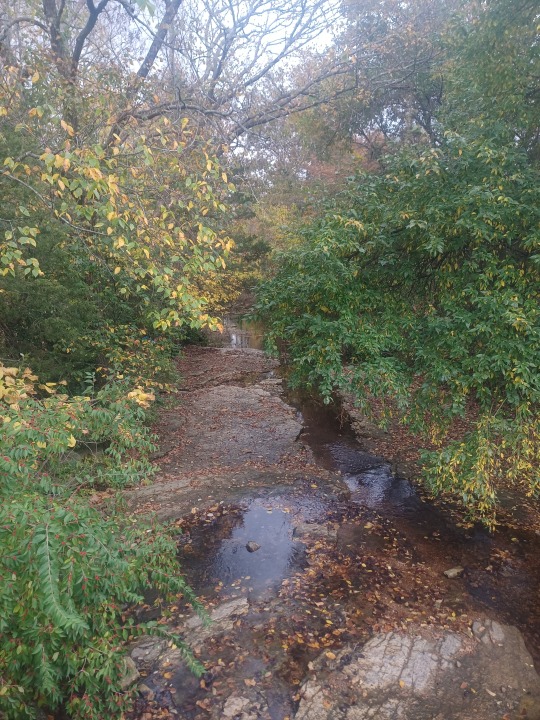
It’s Tell a Friend Friday!
Please enjoy this photo I took of my childhood creek in the Missouri Ozarks; there are a lot more invasive honeysuckle bushes than I remember, but it's still so nice to visit a place that was so formative to who I am today.
Then tell someone you know about my work–you can reblog this post, or send it to someone you think may be interested in my natural history writing, classes, and tours. Here’s where I can be found online:
Website - http://www.rebeccalexa.com
Rebecca Lexa, Naturalist Facebook Page – https://www.facebook.com/rebeccalexanaturalist
Tumblr Profile – http://rebeccathenaturalist.tumblr.com
BlueSky Profile - https://bsky.app/profile/rebeccanaturalist.bsky.social
Twitter Profile – http://www.twitter.com/rebecca_lexa
Instagram Profile – https://www.instagram.com/rebeccathenaturalist/
LinkedIn Profile – http://www.linkedin.com/in/rebeccalexanaturalist
iNaturalist Profile – https://www.inaturalist.org/people/rebeccalexa
Finally, if you like what I’m doing here, you can buy me a “coffee” at http://ko-fi.com/rebeccathenaturalist
#Tell a Friend Friday#creek#stream#fresh water#Missouri#Ozarks#nature#nature photography#water#ecology#environment
11 notes
·
View notes
Text
On TVOKIDS, Various Secrets of the Forest are Teased At, and They Don't Have to Be Super, Natural.
On @TVO is a very #fun #education and #aboriginal look at what goes in in the life of but also 'Secrets of the Forest.' It's worth the look for anyone preparing to visit this world this spring/summer! #review at:
Available on TVOKIDS (Canada), Roku and Apple TV (other regions)
Broadcasting online and on smart TV devices is Secrets of the Forest, a twenty-six episode series that has been releasing an episode a week since Earth Day. It’s an educational program to teach viewers of all ages the best way to cultivate humanity’s relationship with the boreal world. The reason I’m interested in this series is…

View On WordPress
0 notes